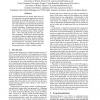1634 search results - page 122 / 327 » Reasoning about Knowledge Using Rough Sets |
MICRO
2008
IEEE
14 years 4 months ago
2008
IEEE
Any architectural optimization aims at satisfying the end user. However, modern architectures execute with little to no knowledge about the individual user. If architectures could...
UAI
2001
13 years 11 months ago
2001
We present a sound and complete calculus for causal relevance that uses Pearl's functional causal models as semantics. The calculus consists of axioms and rules of inference ...
FUIN
2007
13 years 10 months ago
2007
Abstract. Consider an agent executing a plan with nondeterministic actions, in a dynamic environment, which might fail. Suppose that she is given a description of this action domai...
TIME
1994
IEEE
14 years 2 months ago
1994
IEEE
We describe a discrete time probabilitylogic for use as the representation language of a temporal knowledge base. In addition to the usual expressive power of a discrete temporal ...
ILP
2003
Springer
14 years 3 months ago
2003
Springer
Propositionalization has already been shown to be a particularly promising approach for robustly and effectively handling relational data sets for knowledge discovery. In this pap...

